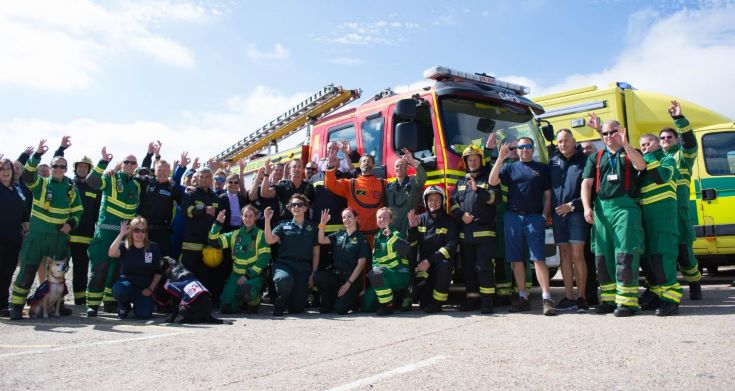Resilience is not just about dealing with traumatic incidents at work…
Have you ever noticed any of these in yourself or a colleague, asks Andy Elwood. Irritability, aggression, tearfulness, inability to concentrate, indecision, loss of confidence? Perhaps this could be coupled with increased consumption of caffeine, alcohol, cigarettes or sedatives and some unplanned absences from work…
Many of us may experience some of these feelings occasionally, which is normal. However, when these feelings start to affect someone’s participation in everyday life or their ability to function safely at work, then we should reach out with support. Mental health first aid is just as important as physical first aid. Would you know how best to approach a colleague or loved one, assist them in a crisis and listen non-judgementally? Find out more here.
Simple tips for improving your wellbeing
Take a minute each morning and evening to note three things for which you are grateful, to give you a positive focus at the start and end of each day. This allows you to focus on what you have, rather than what you are missing. You could add an object to your key ring, which also reminds you to be grateful during the day, if you’re feeling low. Try it, and feel the difference yourself.
The ‘five ways of wellbeing’, based on research and recommended by the UK’s National Health Service (NHS), provide a simple guide to improve your mental strength and wellbeing by realising it’s important to:
connect
keep learning
take notice
be active
give
The beauty of these simple categories is that you can tailor them to suit yourself and what you enjoy doing. I love the outdoors and nature, so meeting a friend for a walk or bike ride enables me to connect, be active and take notice of the beautiful countryside as we chat and enjoy ourselves. Giving can be as simple as sharing a smile with a stranger… it’s surprising how infectious smiles can be.
Work brings a lot of health benefits through a sense of purpose, fulfilment and being part of a team, especially in our line of work. However, mental ill health is usually caused when pressures at work become more intense, coupled with factors outside work, for example, financial pressures, relationship problems, greater caring responsibilities for an ageing population etc.
If the workplace is not supportive at this stage, then mental ill health can manifest itself in common conditions such as depression, anxiety or stress-related disorders.
Organisational culture can change for the better, as the Mind Blue Light Programme recently highlighted with these research key findings from their targeted support:
staff improved their mental health, resilience and confidence to seek support
managers & trainers had more confidence supporting staff in difficult situations
stigma and lack of awareness still exists, but is improving
sustained change requires practical investment, commitment, enthusiasm at all levels
Why not do something positive to start the conversation on mental health where you work? Or perhaps you could share some of this information with a colleague to promote some wellbeing in team999?
On a personal level, I’m no stranger to testing times and traumatic incidents after 20 years in emergency services. Beginning in the Northern Ireland Ambulance Service, but mostly as a paramedic on search and rescue helicopters, I have also served on the RAF Medical Emergency Response Team (MERT) battlefield helicopter in Afghanistan.
Despite learning resilience through military service and search and rescue career, my mental strength has been tested most in my personal life. These events have a cumulative effect over a career and a lifetime and they often hide more and cost individuals more than the large scale or traumatic incidents that we deal with as part of our career on the frontline of life-saving.
I became a mental health campaigner in 2016, when I launched a video campaign online, which involved the coastguard helicopter and other 999 services doing press-ups. Our final video broke down some of the stigma around mental health, with over 45,000 views, but what was really important was that I no longer felt alone. The widespread support from other 999 colleagues made me realise that depression, anxiety and stress were just as common in emergency services personnel as in wider society.

Depression, anxiety and stress are just as common in emergency services personnel as in wider society. All photos: Andy Elwood
Being able to talk has been an incredible help at critical points in my life. It has allowed me to share the burden of my worries and fears, gain another perspective, see a way forward and realise that I was just being human. This worked when I spoke to a psychiatrist after a traumatic incident during which a patient vomited blood into my eyes and mouth. And again five years later while on holiday in France, when I talked to my wife after having a flashback to a patient in Afghanistan.
The largest stigma to overcome, however, was my own self-stigma when I spoke to my doctor last year and admitted I needed some time off work. Burnout had led to depression and a loss of self-esteem from the cumulative build-up of life stressors since childhood. These included the Northern Ireland ‘troubles’, caring for elderly relatives, bereavements, moving home, a new job with promotion and running a business in my spare time.
The bravest thing I have ever done in my life was to take time off work to rest, reset and rebuild myself. I now believe that I will save more lives through mental health campaigning, sharing my experience that #itsoktotalk and by delivering mental health first aid training, than I would if I was still dangling under a helicopter as a paramedic.
To keep learning, I have challenged myself to make a short film about a trip in my classic Land Rover, (#AndysLandie blog) around Scotland this summer, to assist the introduction of the UK Search and Rescue Wellbeing & Resilience framework for Mountain Rescue volunteers in Scotland. I’ll be meeting some inspiring people on the journey and some of them will talk about wellbeing and mental strength from the passenger seat, which will form part of the film. Please get in touch if you’d like to be part of this journey, or if you’d like to invite me to your base as I travel from the Peak District to Scotland.

Andy Elwood is part of the Paramedic Mental Health & Wellbeing Steering group for the college, a Mind Blue Light Champion and he writes a blog called ‘Andy’s Landie’, which discusses mental strength and wellbeing.
You can follow him on twitter and Instagram @4ndyElwood. Remember, #itsoktotalk
Andy Elwood, 06/06/2019